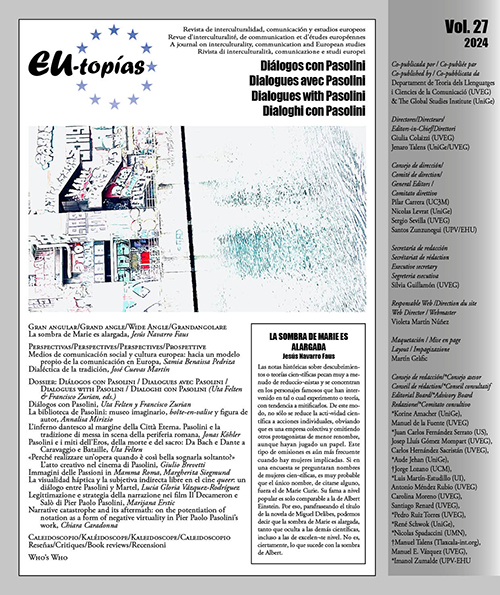Haptic Visuality and the Subjective Free Indirect in Queer Cinema: a Dialogue Between Pasolini and Martel
DOI:
https://doi.org/10.7203/eutopias.27.28417Keywords:
Pasolini, Lucrecia Martel, focalisation, haptic visuality, free indirect discourse. Abstract
Abstract
This article proposes an exploration of the synergies between the haptic visuality conceptualized by Laura Marks and the subjective free indirect defined by Pasolini, as well as the successive reinterpretations of the concept carried out by authors such as Deleuze or Mirizio. Our goal is to analyse how these theoretical perspectives converge in the so-called Salta Trilogy, directed by Lucrecia Martel. Through a careful analysis of La ciénaga (2001), La niña santa (2004), and La mujer sin cabeza (2008), we aim to explore how the intersection between haptic visuality and free indirect subjective can shed light on narrative and sensory strategies in Lucrecia Martel’s filmography, enriching our understanding of her unique contribution to cinematic language.
 Downloads
Downloads
 References
References
Aguilar, Gonzalo. Otros mundos. Un ensayo sobre el nuevo cine argentino. Buenos Aires: Santiago Arco, 2006.
Ahmed, Sara. «Orientations: Toward a queer phenomenology». GLQ: A journal of Lesbian and Gay Studies, 12.4, 2006, pp. 543-574. muse.jhu.edu/article/202832.
Burch, Noel. Praxis du cinéma. Paris: Gallimard, 1969.
Deleuze, Gilles. La imagen-movimiento. Estudios sobre cine 1. Buenos Aires: Paidós, 2005.
De Lauretis, Teresa. «Queer texts, bad habits, and the issue of a future». GLQ: A Journal of Lesbian and Gay Studies 17.2-3, 2011, pp. 243-263. https://doi.org/10.1215/10642684-1163391.
François, Cécile. «El cine de Lucrecia Martel. Una estética de la opacidad». Espéculo: Revista de Estudios Literarios, 43, 2009, pp. 1-14.
Filmaffinity. La ciénaga. https://www.filmaffinity.com/es/film757742.html.
Galt, Rosalind. «Default cinema: queering economic crisis in Argentina and beyond». Screen, 54.1, 2013, pp. 62-81. https://doi.org/10.1093/screen/hjs068.
Genette, Gerard. Nuevo discurso del relato. Madrid: Cátedra, 1998.
Jordà, Joaquin, ed. Cine de poesía contra cine de prosa. Barcelona: Anagrama, 1970.
Lindner, Katharina. Film bodies: Queer feminist encounters with gender and sexuality in cinema. Londres: Bloomsbury Publishing, 2022.
Losada, Matt. «Lucrecia Martel’s La mujer sin cabeza: cinematic free indirect discourse, noise-scape and the distraction of the middle class». Romance Notes, 50.3, 2010, pp. 307-313.
Lury, Karen. «The child in film and television: introduction». Screen, 46.3, 2005, pp. 307-314. https://doi.org/10.1093/screen/46.3.307.
Merleau-Ponty, Maurice. El cine y la nueva psicología, en Sentido y sinsentido. Península, 2000.
Marks, Laura. The Skin of the Film. Durham: Duke University Press, 2000.
Marks, Laura. Touch: Sensuous theory and multisensory media. Minneapolis: University of Minnesota Press, 2002.
Martin, Deborah. The Cinema of Lucrecia Martel. Manchester: Manchester University Press, 2016.
Mirizio, Annalisa. «El cine de poesía: “¿una referencia literaria innecesaria”?». 1616; Anuario de la Sociedad Española de Literatura General y Comparada, 10, 2020, pp. 35-57. https://doi.org/10.14201/16162020103557
Molloy, Missy. «Queer-haptic aesthetics in the films of Lucrecia Martel and Albertina Carri». Studies in Spanish & Latin American Cinemas, 14.1, 2017, pp. 95–111. https://doi.org/10.1386/slac.14.1.95.
Mulvey, Laura. «Visual Pleasure and Narrative Cinema». Screen, 16.3, 1975, pp. 6–18.
Muriano, Nicolás Fernández. «Deleuze lector de Pasolini: acerca del “estilo indirecto libre” en el cine». Imagofagia: revista de la Asociación Argentina de Estudios de Cine y Audiovisual, 9, 2014, pp. 12-17.
Oubiña, David. Estudio crítico sobre La ciénaga: entrevista a Lucrecia Martel. Vol. 1. Buenos Aires: Ediciones Granica, 2007.
Pasolini, Pier Paolo. «La mimesi dello sguardo». Mostra. Per una nuova critica, 1965, pp. 17-35.
Pasolini, Pier Paolo. Empirismo herético. Córdoba: Editorial Brujas, 2005.
Rangil, Viviana. Otro punto de vista. Mujer y cine en Argentina. Buenos Aires: Viterbo, 2005.
Rich, B. Ruby. «New Queer Cinema». Sight and Sound, 2.5, 1992, pp. 30-35 (1ª edición, A Queer Sensation, The Village Voice, 24 de marzo de 1992).
Ríos, Hugo. «La poética de los sentidos en los filmes de Lucrecia Martel». Atenea, 28.2, 2008, pp. 9-22.
Schoonover, Karl y Galt, Rosalind. Queer Cinema in the World. Durham: Duke University Press, 2016.
Shaw, Deborah. «Sex, Texts and Money, Funding and Latin American Queer Cinema: The Cases of Martel’s La niña santa and Puenzo’s XXY». Transnational Cinemas, 4.2, 2013, pp. 165-184. https://doi.org/10.1386/trac.4.2.165_1.
Spivak, Gayatri Chakravorty. «Can the Subaltern Speak?». Colonial Discourse and Postcolonial Theory: A Reader. ed. Patrick Williams and Laura Chrisman. Nueva York: Columbia University Press, 1994, pp. 66-111.
Vázquez-Rodríguez, Lucia Gloria. «Miradas torcidas: una aproximación metodológica al cine queer desde el análisis háptico y la fenomenología». Comunicación & Métodos, 4.2, 2022, pp. 26-39.
Warner, Michael. Fear of a Queer Planet: Queer Politics and Social Theory. New Haven: Yale University Press, 1993.
Downloads
Published
How to Cite
-
Abstract181
-
PDF (Español)45
Issue
Section
License
![]()
The authors conserve the copyright. All content published in EU-topías. Journal of interculturality, Communication, and European Studies are subject to the license Creative Commons Attribution-NonCommercial-ShareAlike 4.0 license. The full text of the license can be found at <http://creativecommons.org/licenses/by-nc-sa/4.0>
They may be copied, used, disseminated, transmitted and publicly displayed, provided that:
- The authorship and original source of the publication is cited (journal, publisher and URL of the work).
- They are not used for commercial purposes.
- The existence and specifications of this license of use are mentioned.
It is the responsibility of the authors to obtain the necessary permissions for images that are subject to copyright.



